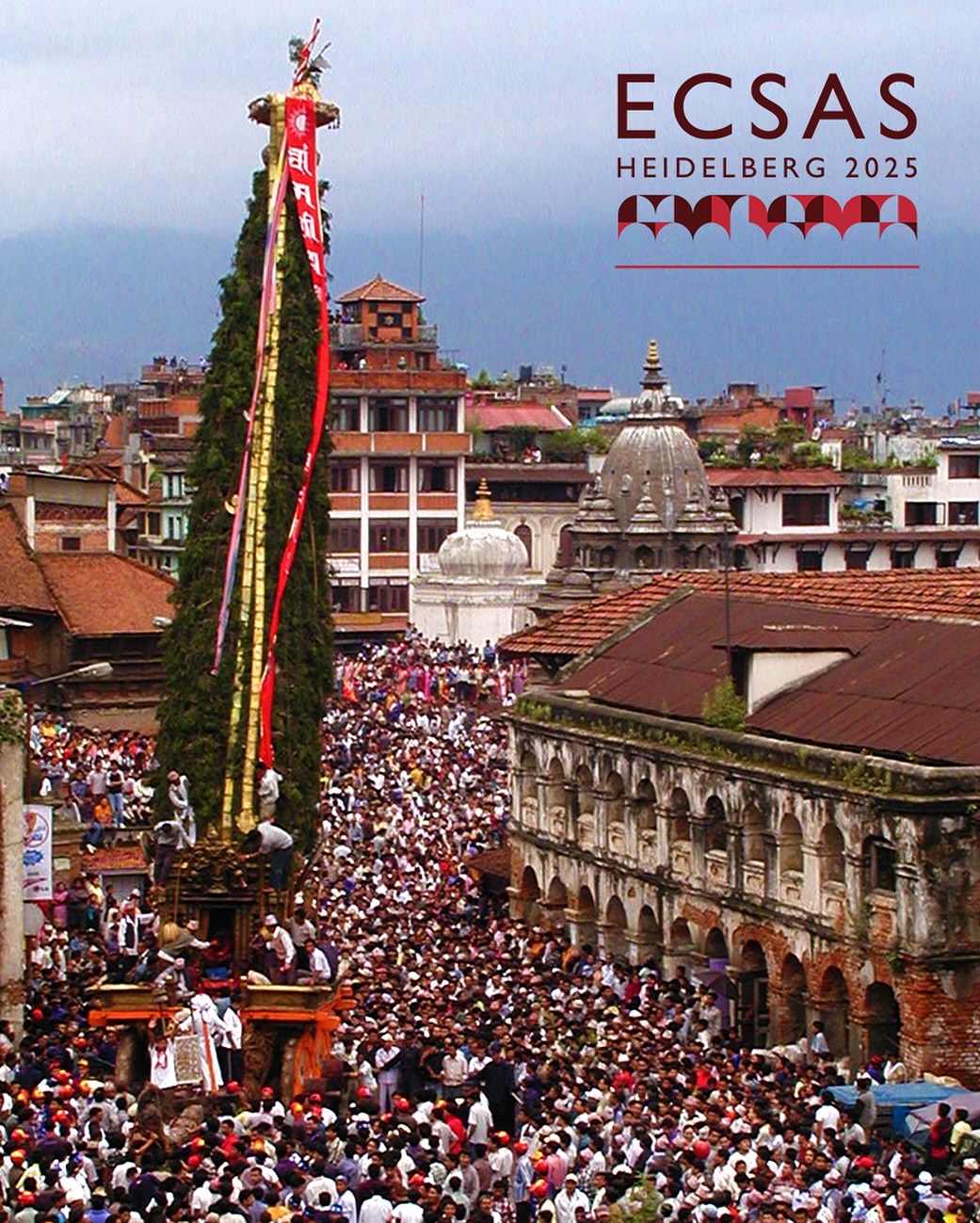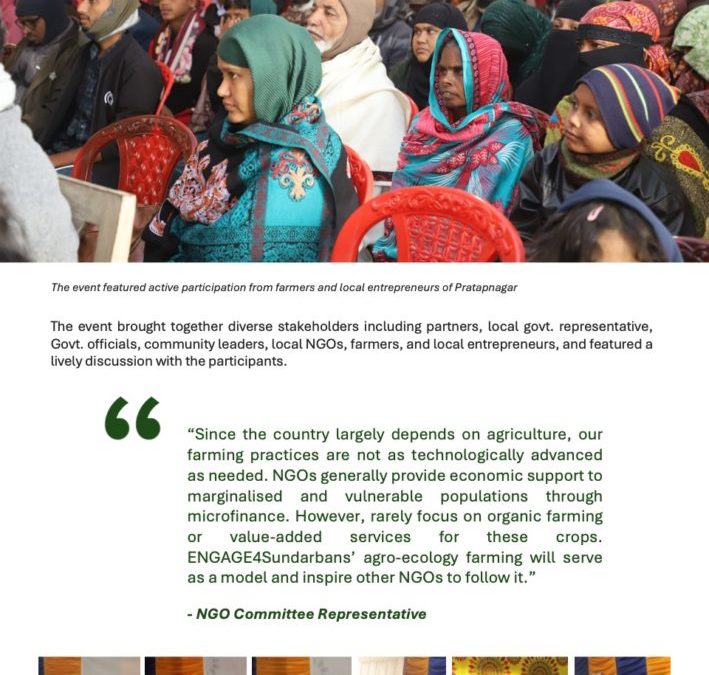
by emilie.cremin@gmail.com | Jan 14, 2026 | Blog, Previous Events, Upcoming Events
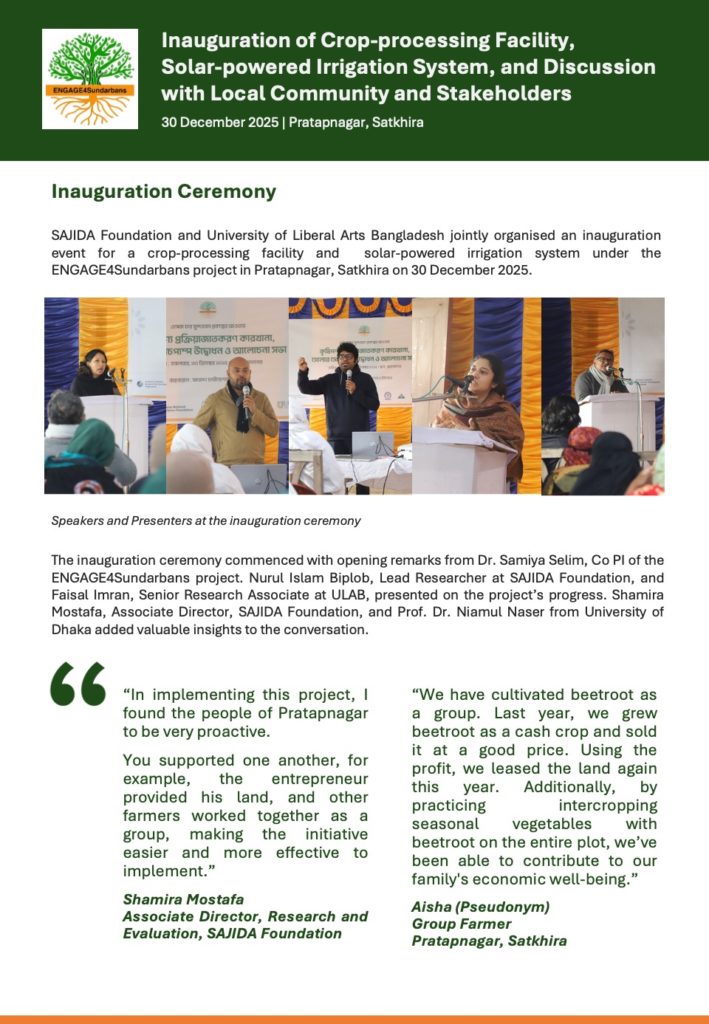
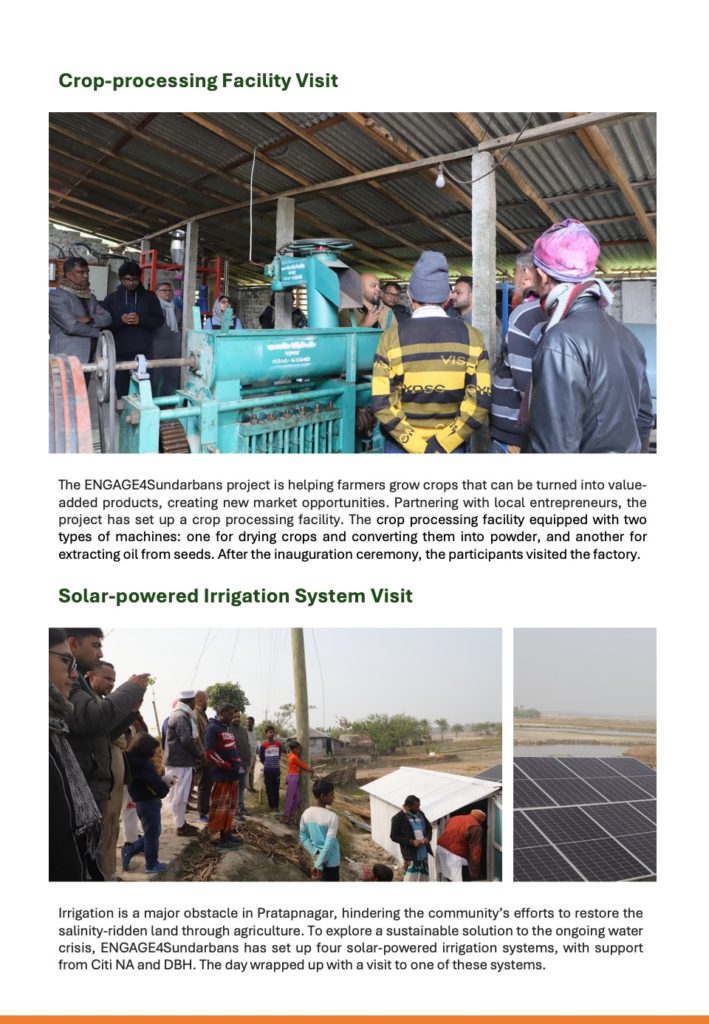
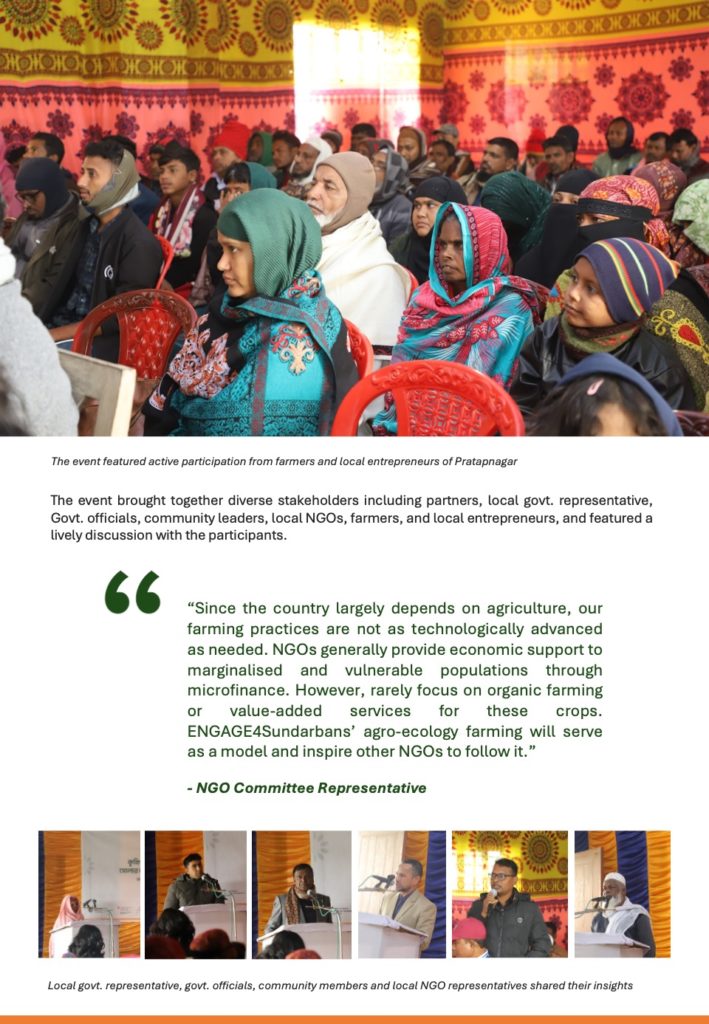
ENGAGE event report (1)
SAJIDA Foundation and the University of Liberal Arts Bangladesh jointly organised an inauguration event for a crop-processing facility and a solar-powered irrigation system under the ENGAGE4Sundarbans project in Pratapnagar, Satkhira, on 30 December 2025, attended by the local community, government officials, NGO representatives, and other stakeholders.
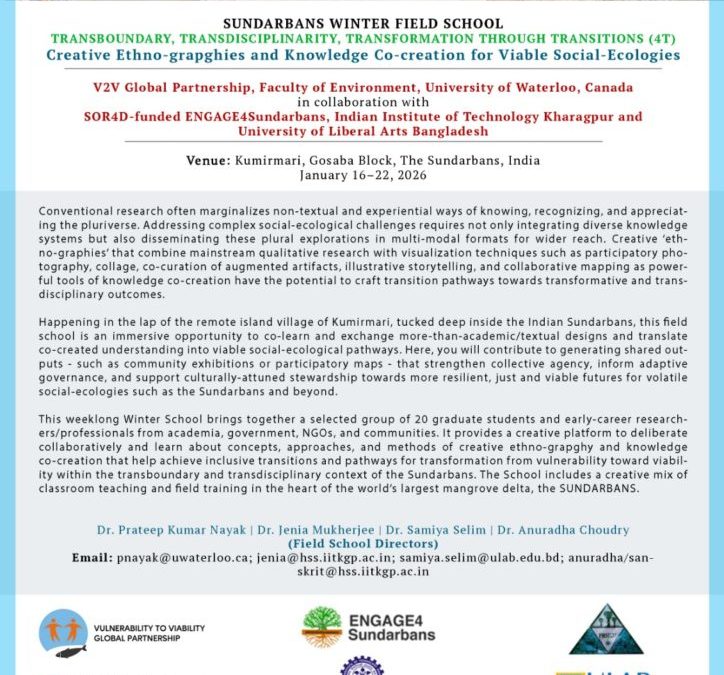
by emilie.cremin@gmail.com | Jan 6, 2026 | Previous Events, Upcoming Events
The 3rd Sundarbans field school will take place from the 16th to the 22d of January 2026.
TRANSBOUNDARY, TRANSDISCIPLINARITY, TRANSFORMATION THROUGH TRANSITIONS (4T)
Creative Ethno-grapghies and Knowledge Co-creation for Viable Social-Ecologies
V2V Global Partnership, University of Waterloo, Canada in collaboration with SOR4D-funded ENGAGE4Sundarbans, Indian Institute of Technology Kharagpur and University of Liberal Arts Bangladesh
Venue: Kumirmari, Gosaba Block, The Sundarbans, India
January 16–22, 2026
Conventional research often marginalizes non-textual and experiential ways of knowing, recognizing, and appreciating the pluriverse. Addressing complex social-ecological challenges requires not only integrating diverse knowledge systems but also disseminating these plural explorations in multi-modal formats for wider reach. Creative ‘ethno-graphies’ that combine mainstream qualitative research with visualization techniques such as participatory photography, collage, co-curation of augmented artifacts, illustrative storytelling, and collaborative mapping as powerful tools of knowledge co-creation have the potential to craft transformative transdisciplinary outcomes.
Happening in the lap of the remote island village of Kumirmari, tucked deep inside the Indian Sundarbans, this field school is an immersive opportunity to co-learn and exchange more-than-academic/textual designs and translate co-created understanding into viable social-ecological pathways. Here, you will contribute to generating shared outputs – such as community exhibitions or participatory maps – that strengthen collective agency, inform adaptive governance, and support culturally-attuned stewardship towards more resilient, just and viable futures for volatile social-ecologies such as the Sundarbans and beyond.
This weeklong Winter School brings together a selected group of 20 graduate students and early-career researchers/professionals from academia, government, NGOs, and communities. It provides a creative platform to deliberate collaboratively and learn about concepts, approaches, and methods of creative ethno-grapghy and knowledge co-creation that help achieve inclusive transitions and pathways for transformation from vulnerability toward viability within the transboundary and transdisciplinary context of the Sundarbans. The School includes a creative mix of classroom teaching and field training in the heart of the world’s largest mangrove delta, the SUNDARBANS.
Dr. Prateep Kumar Nayak I Dr. Jenia Mukherjee I Dr. Samiya Selim I Dr. Anuradha Choudry
(Field School Directors)
Email: pnayak@uwaterloo.ca; jenia@hss.iitkgp.ac.in; samiya.selim@ulab.edu.bd; anuradha/sanskrit@hss.iitkgp.ac.in
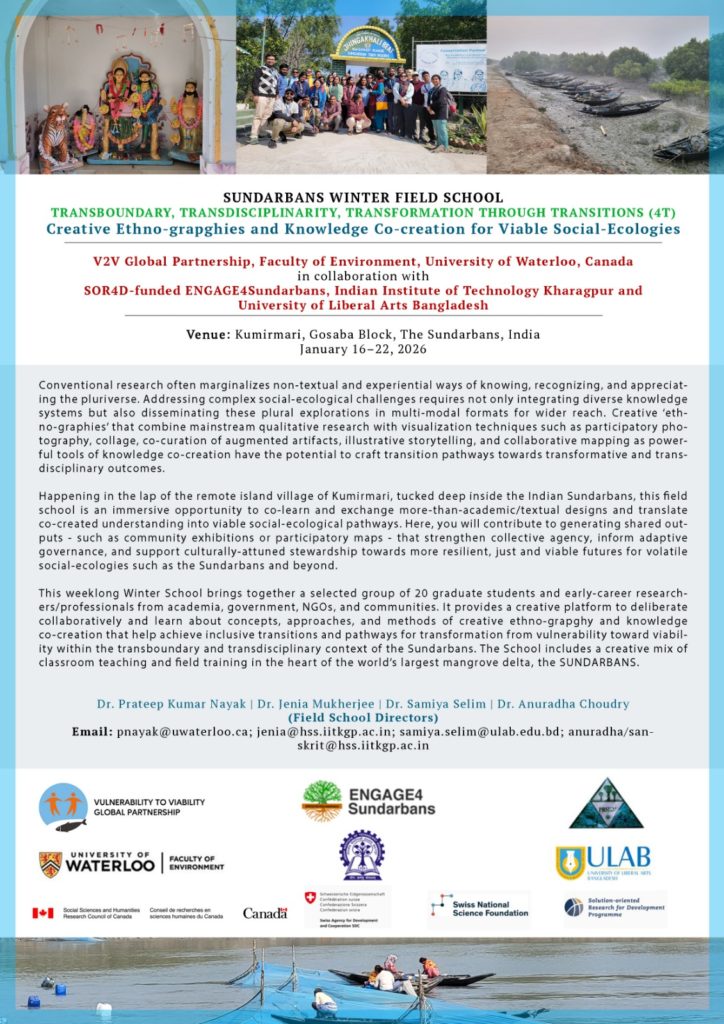

by emilie.cremin@gmail.com | Nov 27, 2025 | Blog, Previous Events, Upcoming Events
ENGAGE4 Sundarbans receives LIVING WITH RIVERS LABEL
“A Label that speaks of possibilities and shares enthusiasm!”
Erik Orsenna, IGFR President
In line with the first international action, Living with Rivers 2022, IFGR is continuing to promote actions in the field for the Future of Rivers!
In 2024, IFGR is setting up with its expert committee the first International River Initiatives Label.
This label aims to highlight positive initiatives and tell of the commitment of actors rooted in the territories in response to the significant challenges facing rivers. Reference indicators established by the IFGR expert committee are used to select initiatives in France and abroad, within a systemic and multidisciplinary framework that takes into account uses.
Find all the labelled initiatives: https://www.initiativesrivers.org/le-label-living-with-rivers/labeled-initiatives/
ENGAGE4Sundarbans page
This multidisciplinary approach opens the selection to an extensive range of initiatives whose expected goals and impacts should strengthen the sustainability of rivers, their territories and their populations.
We intend to provide support to the contributors of initiatives as closely as possible to their needs and to facilitate their actions (financial prizes for the 3 winners, contributions of expertise and visibility, networking, etc.).
We are convinced that it is by action in the field that we can make an impact collectively and inspire other actors. Therefore, we want to place ourselves in the service of those who act concretely in the territories.
Our intention is to provide support to the contributors of initiatives as close as possible to their needs, and facilitate their actions (financial prizes for the 3 winners, the contribution of expertise and visibility, networking, etc.).
We are convinced that it is by action in the field that we can make an impact collectively and inspire other actors. Therefore, we want to place ourselves in the service of those who act concretely in the territories.
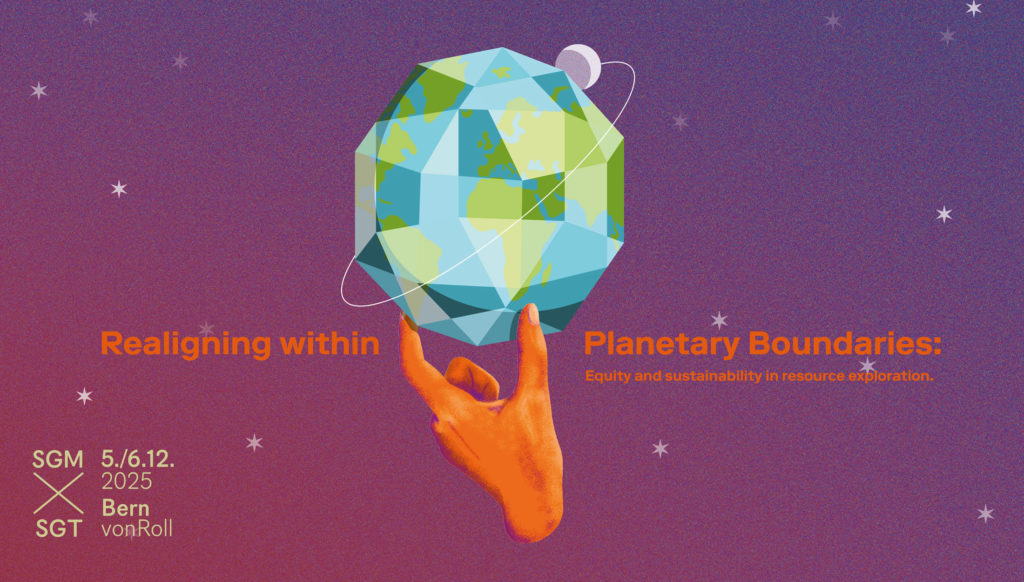
by emilie.cremin@gmail.com | Nov 20, 2025 | Previous Events, Upcoming Events

Our Project member, Emilie Cremin, UNIL, will discuss with Jinat Hossain, University of Bern and Zurich, about Gender issues in the research-action project at at the upcoming
Swiss Geoscience Meeting (SGM) in Bern on the 6th of December 2025.
Science Panel 26. Human Geographies: Feminist Political Geographies and Socially Engaged Research
Room: B303 (Fabrikstrasse 8)
Whose Space Is It Anyway? Perspectives from Marginalised Communities on Occupation and (Re)appropriation of Public Space led by Cosima & Morgane
Each presentation will be allocated 15 minutes, followed by a short discussion. The session will take place on Saturday, 6th December 2025, starting at 11:45.
From Inclusion to Transformation: Feminist Approaches to Co-Development in the South-West Bangladesh
1 Institut de Géographie et de durabilité, FGSE, Université de Lausanne
(emiliehelene.cremin@unil.ch)
2 Institut of Geography, University of Bern, (jinat.hossain@unibe.ch)
This presentation will take the form of a conversation between two researchers.
This discussion will tackle challenges of co-developing adaptation initiatives with local communities in South-West Bangladesh, with a particular focus on the gendered dimensions of participation. International funding schemes increasingly require the inclusion of women in project design, yet operationalising these mandates often encounters structural, cultural, and institutional barriers.
Drawing on our experiences as researchers—positioned, respectively, as outsiders and semi-outsiders—we interrogate how positionality shapes both the
production of knowledge and the implementation of participatory processes.
Our analysis engages with debates in political ecology, feminist geography, and intersectionality to unpack why gender remains a contested and rugged terrain in
adaptation research. We ask how women are positioned within locally led initiatives: to what extent their involvement reflects tokenistic inclusion, symbolic representation, or substantive engagement in decision-making and implementation. We further explore the politics of conversation and meaning-making, highlighting how spoken, unspoken, and relational forms of dialogue reveal tensions between project objectives, local norms, and gendered Expectations.
By situating our reflections within a transdisciplinary and politically engaged practice, we argue that addressing gender in adaptation requires moving beyond
prescriptive participation frameworks towards processes that critically engage with local power relations, cultural constraints, and the positional biases of urban
researchers and development agents. Our contribution seeks to reframe knowledge production as a collective endeavour, opening space for dialogue between scholars, activists, and community organisers, and for rethinking the politics of inclusion in adaptation governance.
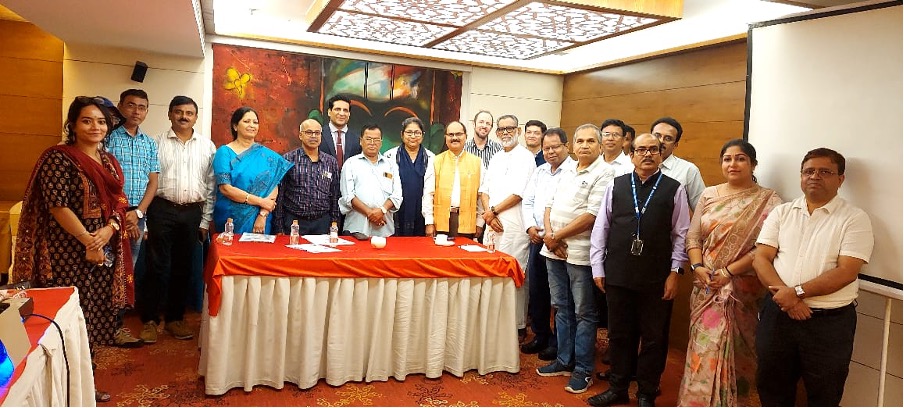
by emilie.cremin@gmail.com | Nov 8, 2025 | Previous Events
Complementary Collectives: Presenting ENGAGE4Sundarbans at the State-level Consultation Workshop
This one-day State-level Consultation Workshop on Collectivised Natural Farming was organised by the School of Geography, Earth and Environmental Sciences of the University of Birmingham, in close partnership with organisations such as the Centre for the Development of Human Initiatives (CDHI), Sakhi Bihar, and Uttar Banga Krishi Viswavidyalaya. Together they have worked and piloted on a transformative model of collectivised farming for creating sustainable and equitable pathways to agricultural prosperity.
This workshop brought together a diverse cohort of researchers, practitioners, policymakers, and community representatives to reflect on a decade of intensive, field-based inquiry into collectivised natural farming. The event was attended by many distinguished guests, including the former Minister for Agriculture of West Bengal; the President of the Indian National Trinamool Trade Union Congress; the Regional Director for South Asia and the Middle East from the University of Birmingham; the Vice-Chancellor of Bidhan Chandra Krishi Viswavidyalaya; as well as representatives from the United Nations Environment Programme (UNEP) and Rythu Sadhikara Samstha (RSS), a key institution in collectivised natural farming in Andhra Pradesh.

Image 1. Cohort of Stakeholders attending the Collectivised Natural Farming Workshop in Kolkata
The presentation by Dr. Jenia Mukherjee, titled “Collectivised Inland Fish Farming as an Economic Wellbeing of Natural Farming in the Indian Sundarbans”, explored the complementary relationship between fishing and farming within the framework of collectivisation. Drawing on the Collectivised Canal Fishing Experimentation (CCFE) under the ENGAGE4Sundarbans project in the island of Kumirmari, Dr. Mukherjee presented a case study that stood out as the only example among the various collectivised agriculture initiatives in the workshop to focus specifically on inland fish farming.
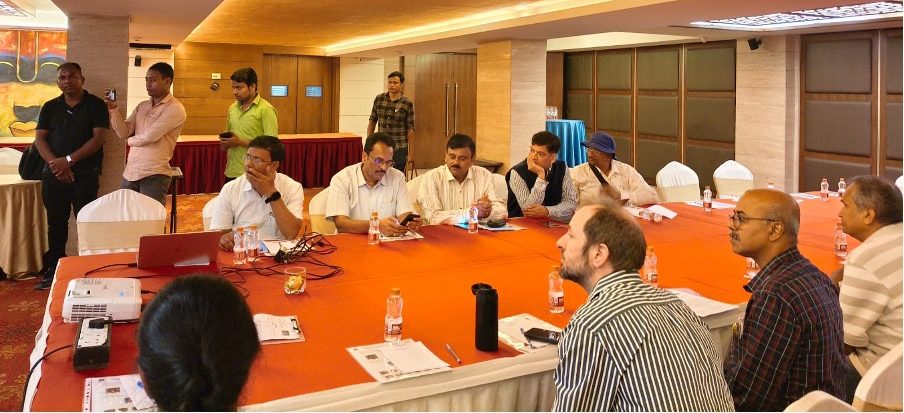
Image 2. Dr. Mukherjee representing ENGAGE4Sundarbans by presenting Collectivised Canal Fishing Experimentation (CCFE) project
Through her presentation, Dr. Mukherjee narrated the evolution of this community-led experiment, describing how each phase of the project organically shaped the trajectory of subsequent interventions. She positioned the initiative as a unique convergence of co-production of knowledge, ethnographic engagement, and scientific methodology.
This approach strongly resonated with the keynote remarks delivered by the former Minister of Agriculture, who emphasised that successful collectivisation must be rooted in a dynamic interplay between theory and practice. He further advocated for deeper collaboration among researchers, policymakers, and practitioners, stressing that communities are more likely to thrive when supported by sustained institutional engagement and inclusive knowledge sharing approaches.
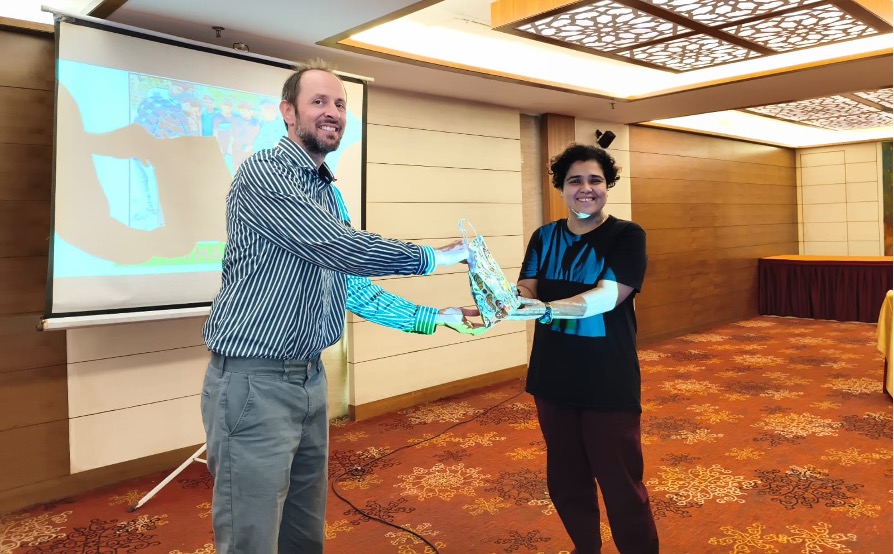
Image 3. Dr. Mukherjee receiving a token of appreciation from Dr. Sugden, University of Birmingham.
One of the key insights from the presentation, as noted by the UNEP Project Lead, was the significant potential for scaling the collectivised canal fishing model. This prospect was also evident in Dr. Mukherjee’s presentation, where she highlighted how community members themselves initiated efforts to maintain the canal ecosystem and integrate traditional practices—such as mulching and cattle rearing—into the collective framework. These community-led actions not only reflect a strong sense of ownership but also indicate a viable pathway for the model’s scalability through locally embedded knowledge and participatory resource management.
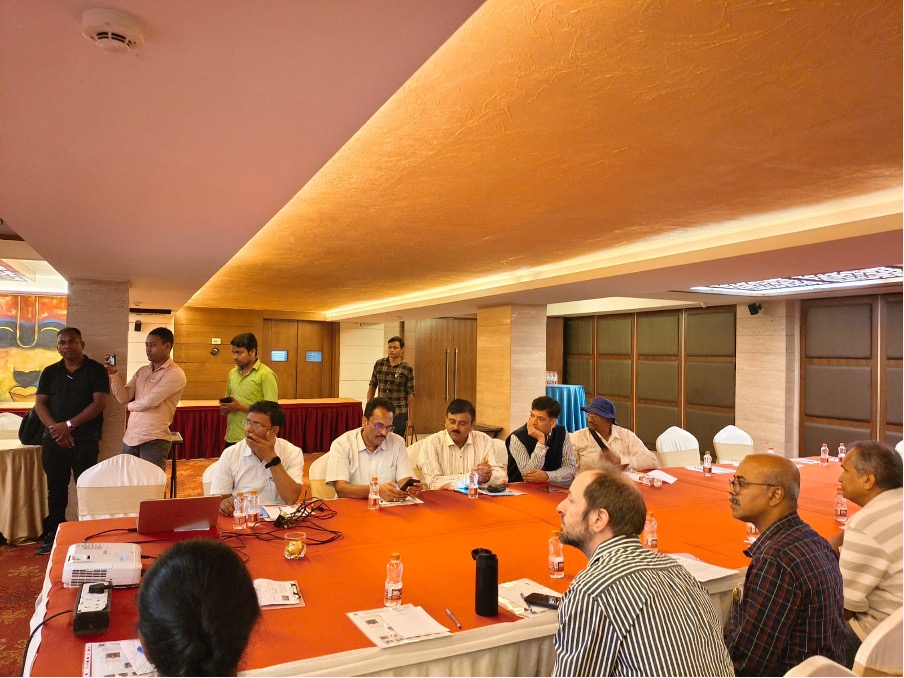
Image 4. Stakeholders engaging in shared commitment through collective action
The session concluded with a vibrant Q&A segment, offering delegates an opportunity to engage directly with the presenters, deepen their understanding and reflect on key themes. In his valedictory address, Dr. Fraser Sugden, underscored the cruciality of grounding interventions in local cultural contexts and geographically specific practices to ensure long-term sustainable impacts. He highlighted the value of cross-disciplinary dialogue, such as this workshop, as vital for cultivating integrated, intergenerational and adaptive approaches to natural resource governance. Moving forward, it is recommended that future initiatives continue to prioritise locally informed, community-driven models while nurturing collaboration across research, policy and practice. Such engagements not only strengthen the knowledge base but also build resilient systems that are responsive to the complexities of socio-ecological change.

by Shimim Mushsharat | Sep 30, 2025 | Previous Events
The ENGAGE4Sundarbans team will participate in the 28th European Conference on South Asian Studies (ECSAS), taking place in Heidelberg, Germany, from October 1–4, 2025. During the conference, the team is organising a panel titled “Living with and Recovering from Coastal and Riverine Disasters: A Critical Approach to Riskscape”.

Under this panel, Samiya Selim, Director and Professor, Centre for Sustainable Development, University of Liberal Arts Bangladesh, and Md Nurul Islam, Lead Researcher, Research and Evaluations at SAJIDA Foundation, will deliver a presentation on “Governing the Commons: An Ethnographic Exploration of Local Adaptation Response to Complex Global Problems.”
Emilie Cremin, Institute of Geography and Sustainability – IGD, University of Lausanne, Switzerland; Souradip Pathak – IIT Kharagpur, India; and Tapas Mondal – SJSM, NGO, Kolkata, India, will be delivering a presentation on “Restoring Rights and Resilience: Ādivāsī Communities, Traditional Knowledge, and Environmental Conservation in the Indian Sundarbans” during the panel.
Emilie Cremin will convene this panel.
The discussion will focus on the challenges faced by riverine, deltaic, and coastal regions of South Asia, which are regularly exposed to cyclones, floods, and storm surges. These recurring hazards not only damage agriculture and infrastructure but also displace communities. The panel will explore how different stakeholders respond to these risks—through public management, community initiatives, agro-ecological practices, and nature-based solutions—while critically examining their effectiveness. By engaging with questions of power, the hydrosocial cycle, and local socio-ecological contexts, the session seeks to foster knowledge exchange on sustainable reconstruction and adaptation in complex, multi-risk environments.
Learn more about the conference: Click Here
Riverine, deltaic, and coastal areas of South Asia are frequently affected by hydrometeorological hazards, such as cyclones, floods, and storm surges. These recurring events damage agricultural production and public and private infrastructure. As a result, erosion of the coasts and banks has led to the displacement of many villages. For this panel, we are seeking contributions that examine the adaptive strategies deployed by different categories of stakeholders to cope with and adapt to hazards. The effectiveness of public management of hazards through structural (extension of embankments, construction of shelters, etc.) and non-structural (awareness raising, support for adaptive strategies, etc.), individual and collective strategies based on agricultural adaptations and agro-ecological technologies used in rice or shrimp farming, nature-based solutions initiatives, coastal or river restoration practices and other alternatives are all being called into question. Overall, we aim to create a site-based knowledge exchange that critically addresses the issue of adaptation by examining power relations between public and private sector actors to highlight the limitations of strategies adaptation. We thus wish to explore the source of the problem, considering the hydrosocial cycle and the social, economic, and ecological situations that support sustainable reconstruction in spaces exposed to multiple risks.
Presentations
Selim Samiya – Center for Sustainable Development, University of Liberal Arts Bangladesh, Dhaka, Bangladesh
Islam Nurul – Sajida Foundation, Sajida Foundation, Dhaka, Bangladesh
This paper examines the critical role of place-based, localized governance systems for protecting and restoring commons i.e access to land access and water systems that benefit communities over corporate investment. It highlights the importance of community-centric governance approaches and bottom-up policy frameworks in fostering resilience by returning the rights of commons to the communities.The study emphasizes the need for localized governance of commons and a bottom-up policy approach to enhance social resilience of coastal communities facing the complex dual challenges of climate change and human intervention. By analyzing the role of the local governance system in managing shared resources, the paper aims to provide actionable insights for policymakers, practitioners, and community stakeholders involved in common resource management and policy formulation.
Theocharis Angelos – Department of Media, Culture, Heritage, Newcastle University, Newcastle Upon Tyne, United Kingdom
Indigenous worldviews encompass nuanced understandings of cultural adaptation, recognising change as an intrinsic part of sustaining living cultures and landscapes amid environmental shifts. Many Indigenous communities perceive time as cyclical, fostering continuity and resilience through transformation. This paper examines Indigenous adaptation strategies in deltaic environments, where climate crisis exacerbates existing ecological vulnerabilities. Drawing on Indigenous films from the Ganges-Brahmaputra-Meghna Delta in Bangladesh, the Red River and the Mekong Deltas in Vietnam, I will explore how Indigenous narratives illustrate adaptation as a complex interplay of loss, resilience, and innovation. Dao filmmakers in Vietnam document shifts in traditional cultural practices due to resource scarcity. Khmer communities in the Mekong Delta, facing soil salinization and erratic weather, adopt alternative livelihoods. The Munda people of Bangladesh, displaced by climate disasters, navigate transformations in social and economic practices while maintaining cultural identity. This paper argues that Indigenous strategies frame adaptation as a relational, forward-looking process that integrates cultural continuity with necessary transformations.
Crémin Emilie – Instititute of Geography and suistainability – IGD, University of Lausanne, Lausanne, Switzerland
Souradip Pathak – IIT Kharagpur, Kharagpur, Kharagpur, India
Tapas Mondal – SJSM, NGO, Kolkata, India
This article delves into the environmental history of ādivāsī communities, including the Munda and Santal, who rely on the Indian Sundarbans for their livelihoods. Displaced during colonial rule, these communities have since developed a symbiotic relationship with the forest, acquiring extensive ecological knowledge critical for its preservation. Despite their expertise, ādivāsī communities face severe challenges from recurrent
geophysical and human-made hazards. Additionally, they face significant socioeconomic challenges. They are among the poorest and most vulnerable groups in India, with limited access to education, healthcare, and economic opportunities. Their exclusion from forest areas, driven by conservation policies and development projects, has further undermined their livelihoods. Their vulnerability is exacerbated by socioeconomic
marginalisation, exclusion from forest areas, and the impacts of development projects like tourism and industrialisation.
